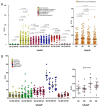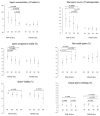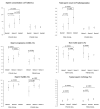Role of Mediterranean Diet and Ultra-Processed Foods on Sperm Parameters: Data from a Cross-Sectional Study
- PMID: 40647172
- PMCID: PMC12250936
- DOI: 10.3390/nu17132066
Role of Mediterranean Diet and Ultra-Processed Foods on Sperm Parameters: Data from a Cross-Sectional Study
Abstract
Background/Objectives: Male infertility is multifactorial, involving genetic, environmental, lifestyle, and medical factors. Recent research has underscored the influence of lifestyle choices, such as dietary habits, smoking, alcohol abuse, and metabolic disturbances, on sperm quality. In this context, nutrition plays a pivotal role: adherence to a healthy diet like the Mediterranean Diet (MD), which emphasizes seasonal, fresh, and whole foods, has been linked to improved sperm performance. Conversely, a high intake of ultra-processed foods (UPFs), characterized by additives, high levels of sugars, fats, and salt, and a nutrient-poor profile, may impair sperm quality. Methods: Based on data supporting the reproductive health benefits of the MD, this observational cross-sectional study aimed at evaluating the possible relationship between MD adherence, assessed using the 14-point a priori Mediterranean Diet Adherence Screener (MEDAS) and intake of ultra-processed foods (UPFs), based on the NOVA classification, and sperm quality in 358 individuals (mean age 34.6 ± 9.3 years) who spontaneously referred to our center of reproductive medicine. Semen analyses were performed according to the WHO 2021 criteria. Hormonal profiles (FSH, LH, testosterone, SHBG, bioavailable testosterone, and calculated free testosterone) were also determined. Results: MD adherence score was significantly and positively correlated with semen parameters, whilst negatively correlated with FSH and LH levels. In contrast, UPF intake was correlated with poor semen parameters, whilst no association was observed with hormonal levels. Multivariate analyses confirmed these associations and showed the independency from age and BMI. Notably, among men with FSH levels < 8 IU/mL, higher quartiles of UPF intake had lower markers of sperm quality, particularly for viability and typical morphology. Differently, high MD adherence scores were associated with high quality sperm parameters even when FSH levels were >8 IU/mL. Conclusions: This study provides evidence that the adherence to MD, and conversely reduced intake of ultra-processed foods, is associates with a better semen profile. These findings suggest the possible role of dietary interventions as a modifiable factor in the management of male infertility.
Keywords: Mediterranean diet; diet; fertility; infertility; nutrients; nutrition; sperm parameters; ultra-processed food.
Conflict of interest statement
The authors declare no conflicts of interest.
Figures






Similar articles
-
Dietary patterns, foods and nutrients in male fertility parameters and fecundability: a systematic review of observational studies.Hum Reprod Update. 2017 Jul 1;23(4):371-389. doi: 10.1093/humupd/dmx006. Hum Reprod Update. 2017. PMID: 28333357
-
Consumption of ultra-processed foods and female infertility: a cross-sectional study.Front Public Health. 2025 Jun 30;13:1597910. doi: 10.3389/fpubh.2025.1597910. eCollection 2025. Front Public Health. 2025. PMID: 40662109 Free PMC article.
-
Nutritional interventions for survivors of childhood cancer.Cochrane Database Syst Rev. 2016 Aug 22;2016(8):CD009678. doi: 10.1002/14651858.CD009678.pub2. Cochrane Database Syst Rev. 2016. PMID: 27545902 Free PMC article.
-
Mediterranean Diet, Semen Quality, and Medically Assisted Reproductive Outcomes in the Male Population: A Systematic Review and Meta-Analysis.Adv Nutr. 2025 Aug;16(8):100454. doi: 10.1016/j.advnut.2025.100454. Epub 2025 May 24. Adv Nutr. 2025. PMID: 40419219 Free PMC article. Review.
-
Specially formulated foods for treating children with moderate acute malnutrition in low- and middle-income countries.Cochrane Database Syst Rev. 2013 Jun 21;(6):CD009584. doi: 10.1002/14651858.CD009584.pub2. Cochrane Database Syst Rev. 2013. PMID: 23794237
References
-
- Levine H., Jørgensen N., Martino-Andrade A., Mendiola J., Weksler-Derri D., Jolles M., Pinotti R., Swan S.H. Temporal Trends in Sperm Count: A Systematic Review and Meta-Regression Analysis of Samples Collected Globally in the 20th and 21st Centuries. Hum. Reprod. Update. 2023;29:157–176. doi: 10.1093/humupd/dmac035. - DOI - PubMed
-
- Garolla A., Petre G.C., Francini-Pesenti F., De Toni L., Vitagliano A., Di Nisio A., Grande G., Foresta C. Systematic Review and Critical Analysis on Dietary Supplements for Male Infertility: From a Blend of Ingredients to a Rationale Strategy. Front. Endocrinol. 2022;12:824078. doi: 10.3389/fendo.2021.824078. - DOI - PMC - PubMed
-
- Humaidan P., Haahr T., Povlsen B.B., Kofod L., Laursen R.J., Alsbjerg B., Elbaek H.O., Esteves S.C. The Combined Effect of Lifestyle Intervention and Antioxidant Therapy on Sperm DNA Fragmentation and Seminal Oxidative Stress in IVF Patients: A pilot study. Int. Braz. J. Urol. 2022;48:131–156. doi: 10.1590/s1677-5538.ibju.2021.0604. - DOI - PMC - PubMed
Publication types
MeSH terms
LinkOut - more resources
Full Text Sources
Medical
Miscellaneous

